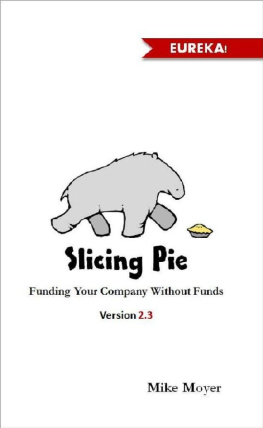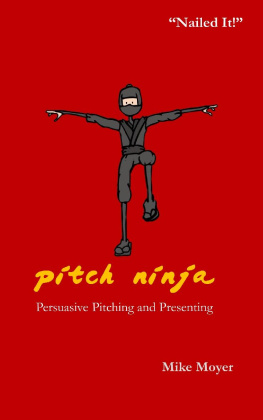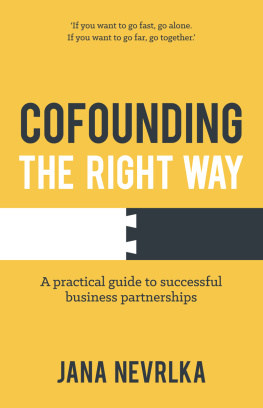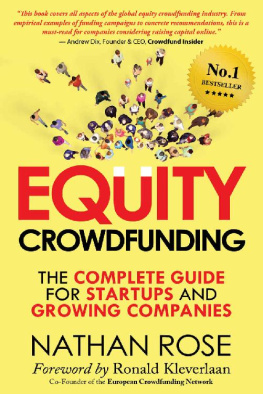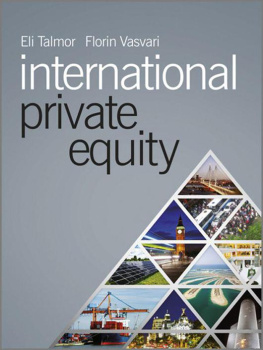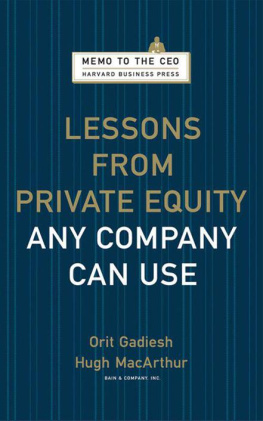
Slicing Pie
Funding Your Company Without Funds
- Version 2.3 -
Mike Moyer
Praise for the Pie:
Thank you for writing this book! Seriously has changed my life for the better. Having worked with start-ups for a few years now I feel like a giant elephant just got off my back.
Slicing Pie is brilliant! Youve cracked the code on a big problem for startups. I read this just in time!
This book was a pleasure to read. It didnt waste any time and got straight to point. The Grunt Fund is a great way to build a team in the gap phase of a startup, allowing for flexibility, while being equitable to everyone contributing resources. This book is a must read for anyone in my position building a team to turn an idea into reality.
Im just beginning with my new startup, and this Grunt Fund method is just what I needed! Ive quit another startup where I was collaborating because the method for slicing the pie was not fair. So I felt the need for this, and found your book. Perfect!
The Grunt Fund is the cleanest, clearest way to get any project off the ground. Its easily understandable and cuts through the legal haze that can plague startups.
Youre a genius.
My Promise
If, after reading this book, you dont feel that it contains not just good advice, but the greatest advice on the subject that you have ever received, I will happily refund your money and apologize for wasting your time.
Mike@SlicingPie.com
My Butt-Covering Disclaimer
If anything in this book sounds like legal advice its not. If anything in this book sounds like financial advice its not. Im not a lawyer and Im not an accountant and Im not a certified financial advisor.
Im a Grunt.
For International Readers
In this book I use the term Grunt. The word does not easily translate into other languages and cultures so I thought it might help to give you a little background before you start reading.
In the United States the term Grunt is a slang term that was originated by the military to refer to people who do hard work and are often new to their post. The term Grunt Work is common in US startups and businesses.
Release Notes: Version 2.3
A list of major changes for version 2.3 can be found on page 197.
One More Thing
In this book I present a set of rules that I believe constitute fair play when it comes to dividing up equity. If you disagree with my rules as outlined here, thats fine. Make up your own rules. As long as they are fair and everyone agrees to them in advance, you should be fine.
Preface
I would like to start a business with you. I look forward to working with you to find and exploit opportunity in the market that our slow-moving competition has overlooked or is too arrogant to bother going after. I cant wait to steal their market share by creating a product or service that lures their customers away en masse.
I hope we can poach the best employees away from their day jobs or other start-ups. Im sure their former employers will weep, but theyll get over it.
Im sure our irreverent approach to marketing and advertising will ruffle a few feathers along the way, but thats the idea. I want our videos to go viral so we can beat those fat-cat marketing budgets from the establishment.
Its going to be fun to watch our success and see the impact we have on the market. Our competition, unable to keep up with us, will wither and die. Thats okay. Its not personalits just business.
Before we start, however, I want to get a few things straight:
When it comes to the competition there are no holds barred. When it comes to our company and our team, however, we need to treat everyone fairly and honestly.
In business, some people may get burned. Its okay to burn the competition. Its not okay to burn each other.
Most start-up books are about breaking the rules. This one is about making them. It outlines rules of conduct about how we will treat one another when it comes to the equity in our start-up company.
Equity in the business will ultimately reward us for our individual contributions to success, when we get there. So dividing the equity fairly is critical. We need a few rules. The reason we need these rules is simple:
Fairness is More Fun.
In spite of the setbacks, the struggles, the stress, the long hours, the hard work and even the occasional failure, start-ups are fun as long as everyone participating in the start-up is treated fairly.
When everyone feels that they are getting what they deserve, everyone can get along and move the business forward as a team.
Backstabbing, greed and politicking, on the other hand, suck the fun out of a start-up faster than your companys rogue article gets deleted from Wikipedia.
Ask an old entrepreneur to reminisce about the good times and she will tell you about the high-pressure, the late nights, the victories and the defeats. Each story is exciting and inspirational. The story is always different.
Ask an old entrepreneur about the bad times and he will tell you how he was burned by a partner or an investor or a co-worker. The story is always the same.
No matter what happens in the coming months and years, I want this to be one of the good times.
So lets agree on a few basic ground rules about how to treat each other fairly before the money and emotions get in the way. I want to treat you fairly and I want to be treated fairly. Thats my only agenda.
Lets begin
Introduction
Ive been an entrepreneur most of my career. Ive been driven, for better or for worse, into new businesses or established businesses that want to change their old ways. And, while I am certainly interested in making enough money to buy Gods summer house on Long Island, I know deep down that even without the money, there is another important measure of success.
All start-ups eventually cease being start-ups. They usually go out of business, but sometimes they turn into real companies or are bought by other companies and, thus, lose their start-up-ness.
If the team that started the business is ready and willing to jump right back in and do it again together regardless of the outcome, then I think you have success.
Success means you do right by those who believed in you. Hopefully, at the end of your start-up, you all will laugh so hard that $100 bills squirt out your nose. But even if $100 bills dont squirt out your nose you can all get up, dust each other off, and do it againthis time older and wiser.
Slicing Pie is a short book about doing right by those who believe in you.
The Gap
Somewhere between the inception of your earth-changing idea and the investor presentation to Sequoia Capital or Andreessen Horowitz there is a gap. During that gap you are expected to have actually built something that resembles a business enough that the gentle and kind venture capitalist will decide that you have your act together and write you a fat check. I call it the Gap because its during this time that you either fill the gap with behaviors that create a business or let it consume you and your wonderful idea. Most fledgling businesses experience the latter.
The days of back-of-the-envelope deals are over. (In fact, they may never have actually existed.) Few investors are willing to provide capital to a company that is little more than a rough idea.
Nowadays you need to have something worth investing in which often means a management team, a business plan, and, if youre smart, a working prototype. For bonus points get a few beta customers who are actually paying you. Now you have something worth discussing.

